Corporate Governance and Social Responsibility: An In-Depth Analysis
VerifiedAdded on 2020/07/23
|14
|3855
|42
Report
AI Summary
This report examines the critical aspects of corporate governance and social responsibility in the modern business landscape. It delves into the significance of stakeholder management, emphasizing the need for companies to consider the interests of various groups, including customers, employees, and communities, alongside shareholders. The report reviews literature on corporate governance, business ethics, and the role of government. It highlights the importance of ethical practices, legal compliance, and the integration of social responsibility into core business strategies. The analysis covers the evolution of business practices, from traditional shareholder-centric models to more inclusive approaches that prioritize long-term sustainability and societal well-being. It also discusses the limitations of certain corporate models and the need for adaptability in a globalized and multifaceted business environment. The report concludes by underscoring the benefits of adopting a broader view of corporate responsibility, which includes the elimination of poverty, reduction in unemployment, and environmental protection.
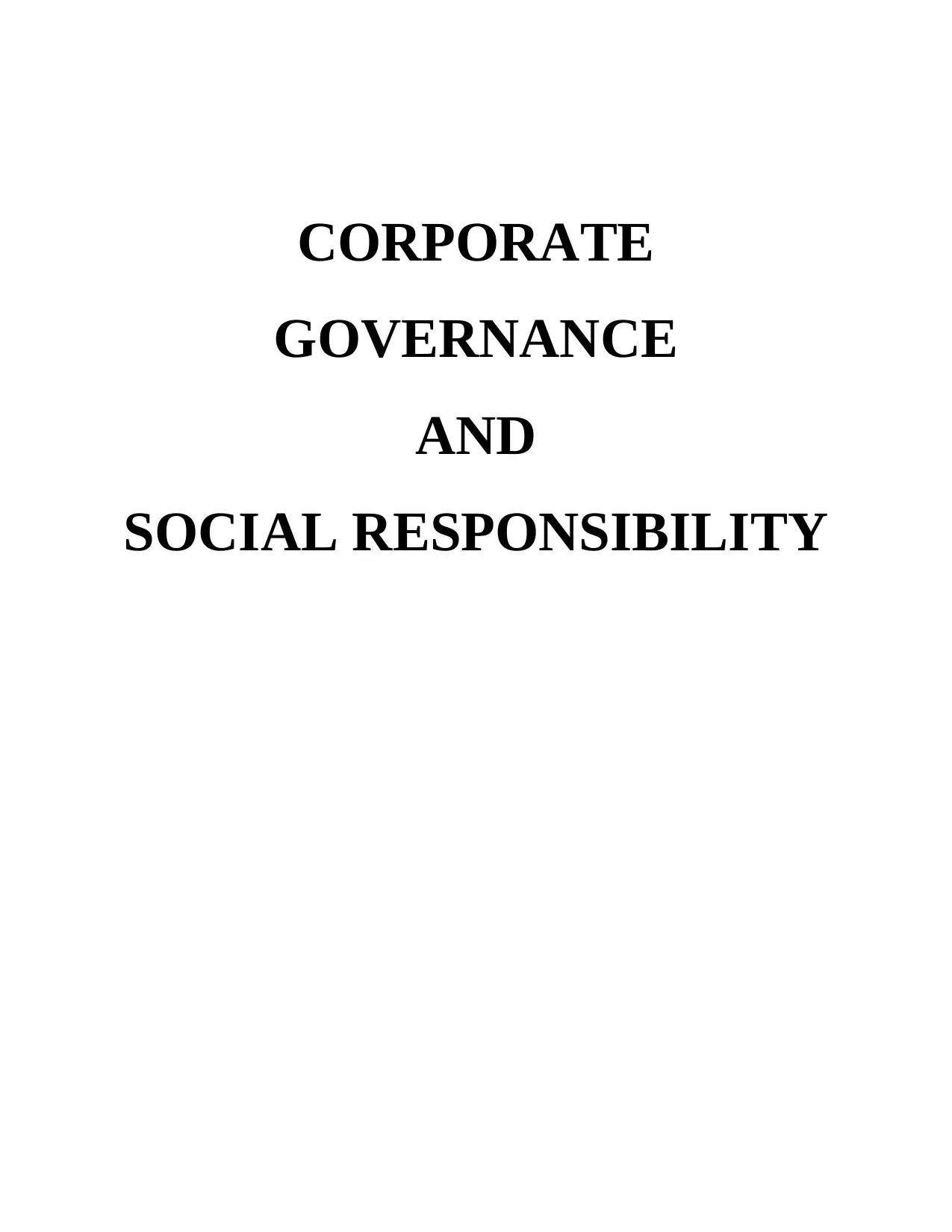
CORPORATE
GOVERNANCE
AND
SOCIAL RESPONSIBILITY
GOVERNANCE
AND
SOCIAL RESPONSIBILITY
Paraphrase This Document
Need a fresh take? Get an instant paraphrase of this document with our AI Paraphraser
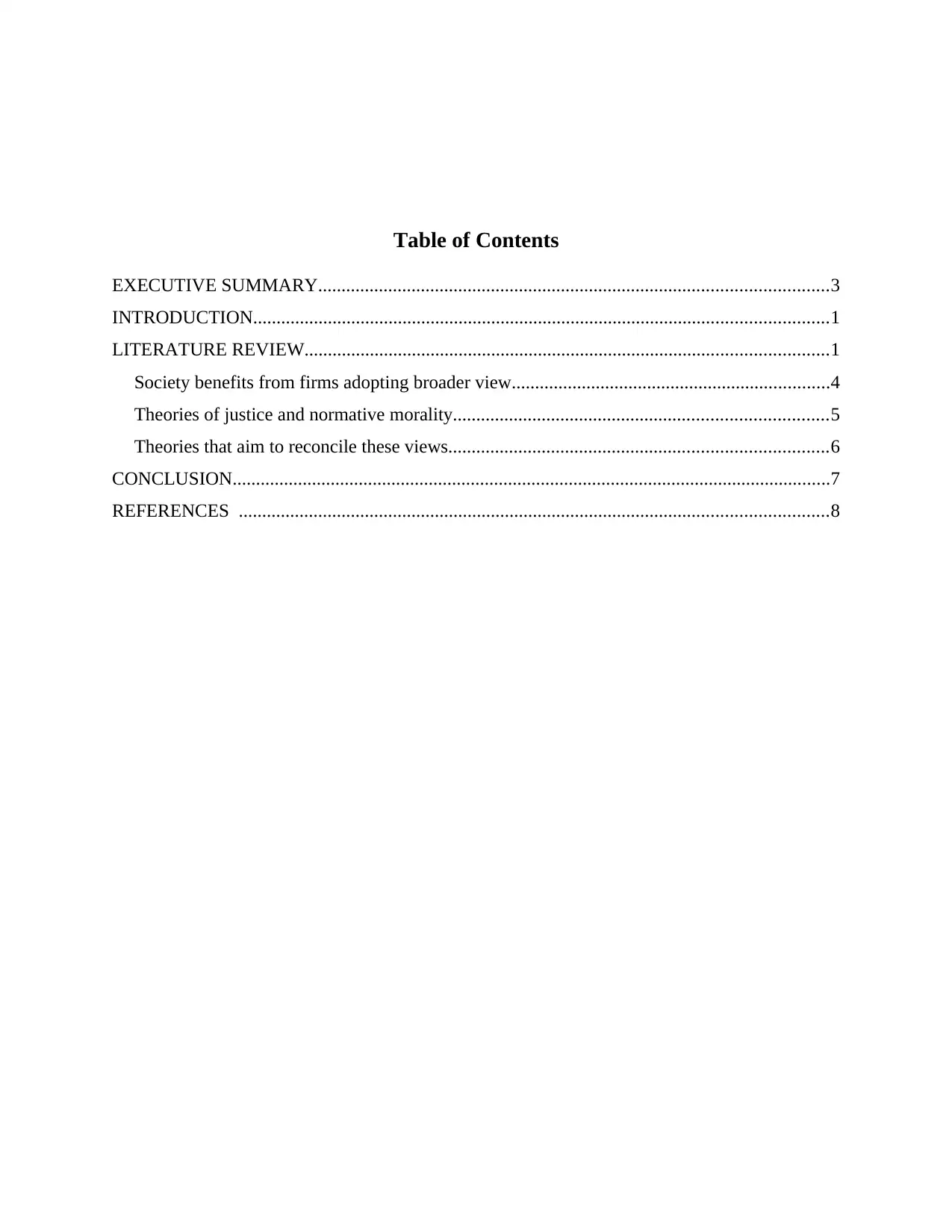
Table of Contents
EXECUTIVE SUMMARY.............................................................................................................3
INTRODUCTION...........................................................................................................................1
LITERATURE REVIEW................................................................................................................1
Society benefits from firms adopting broader view....................................................................4
Theories of justice and normative morality................................................................................5
Theories that aim to reconcile these views.................................................................................6
CONCLUSION................................................................................................................................7
REFERENCES ..............................................................................................................................8
EXECUTIVE SUMMARY.............................................................................................................3
INTRODUCTION...........................................................................................................................1
LITERATURE REVIEW................................................................................................................1
Society benefits from firms adopting broader view....................................................................4
Theories of justice and normative morality................................................................................5
Theories that aim to reconcile these views.................................................................................6
CONCLUSION................................................................................................................................7
REFERENCES ..............................................................................................................................8
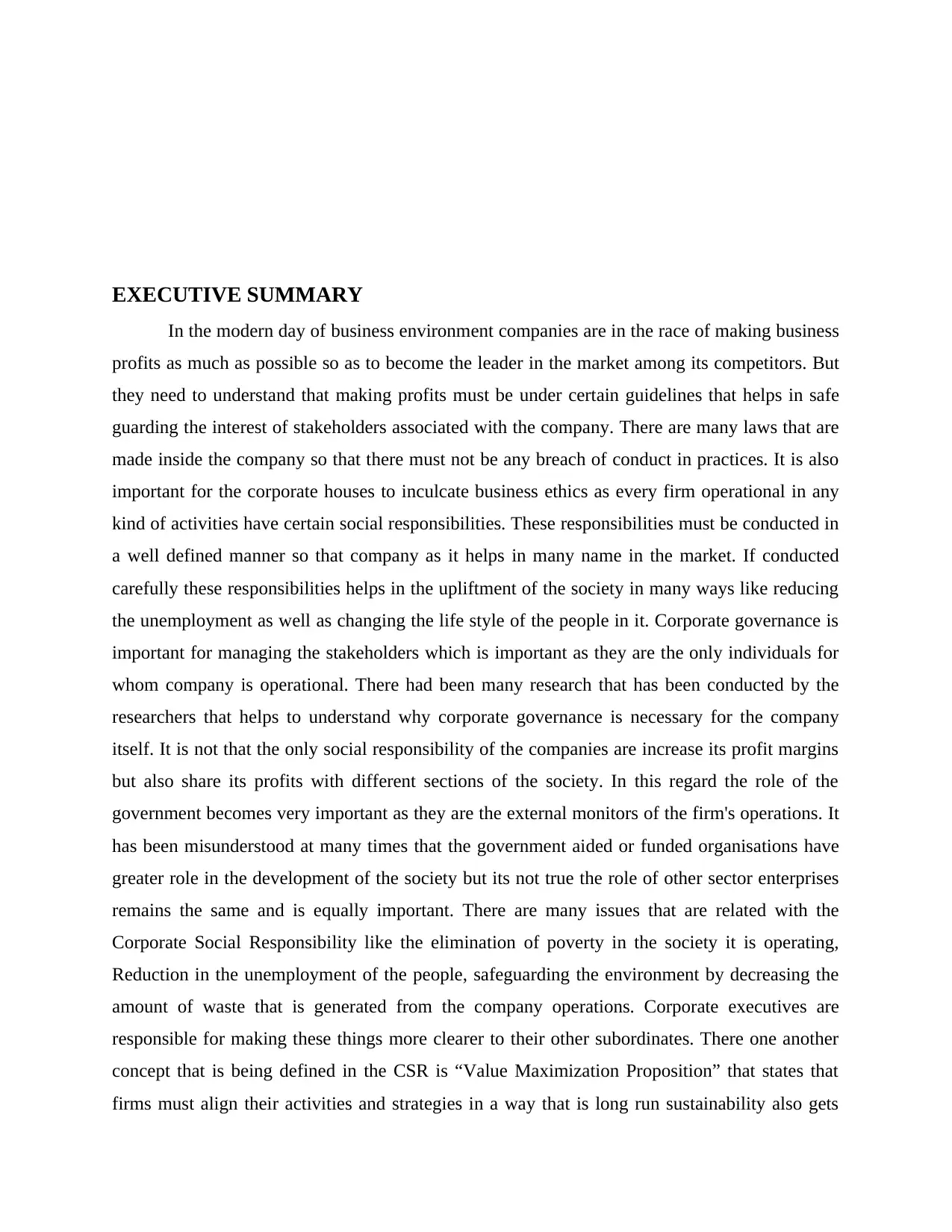
EXECUTIVE SUMMARY
In the modern day of business environment companies are in the race of making business
profits as much as possible so as to become the leader in the market among its competitors. But
they need to understand that making profits must be under certain guidelines that helps in safe
guarding the interest of stakeholders associated with the company. There are many laws that are
made inside the company so that there must not be any breach of conduct in practices. It is also
important for the corporate houses to inculcate business ethics as every firm operational in any
kind of activities have certain social responsibilities. These responsibilities must be conducted in
a well defined manner so that company as it helps in many name in the market. If conducted
carefully these responsibilities helps in the upliftment of the society in many ways like reducing
the unemployment as well as changing the life style of the people in it. Corporate governance is
important for managing the stakeholders which is important as they are the only individuals for
whom company is operational. There had been many research that has been conducted by the
researchers that helps to understand why corporate governance is necessary for the company
itself. It is not that the only social responsibility of the companies are increase its profit margins
but also share its profits with different sections of the society. In this regard the role of the
government becomes very important as they are the external monitors of the firm's operations. It
has been misunderstood at many times that the government aided or funded organisations have
greater role in the development of the society but its not true the role of other sector enterprises
remains the same and is equally important. There are many issues that are related with the
Corporate Social Responsibility like the elimination of poverty in the society it is operating,
Reduction in the unemployment of the people, safeguarding the environment by decreasing the
amount of waste that is generated from the company operations. Corporate executives are
responsible for making these things more clearer to their other subordinates. There one another
concept that is being defined in the CSR is “Value Maximization Proposition” that states that
firms must align their activities and strategies in a way that is long run sustainability also gets
In the modern day of business environment companies are in the race of making business
profits as much as possible so as to become the leader in the market among its competitors. But
they need to understand that making profits must be under certain guidelines that helps in safe
guarding the interest of stakeholders associated with the company. There are many laws that are
made inside the company so that there must not be any breach of conduct in practices. It is also
important for the corporate houses to inculcate business ethics as every firm operational in any
kind of activities have certain social responsibilities. These responsibilities must be conducted in
a well defined manner so that company as it helps in many name in the market. If conducted
carefully these responsibilities helps in the upliftment of the society in many ways like reducing
the unemployment as well as changing the life style of the people in it. Corporate governance is
important for managing the stakeholders which is important as they are the only individuals for
whom company is operational. There had been many research that has been conducted by the
researchers that helps to understand why corporate governance is necessary for the company
itself. It is not that the only social responsibility of the companies are increase its profit margins
but also share its profits with different sections of the society. In this regard the role of the
government becomes very important as they are the external monitors of the firm's operations. It
has been misunderstood at many times that the government aided or funded organisations have
greater role in the development of the society but its not true the role of other sector enterprises
remains the same and is equally important. There are many issues that are related with the
Corporate Social Responsibility like the elimination of poverty in the society it is operating,
Reduction in the unemployment of the people, safeguarding the environment by decreasing the
amount of waste that is generated from the company operations. Corporate executives are
responsible for making these things more clearer to their other subordinates. There one another
concept that is being defined in the CSR is “Value Maximization Proposition” that states that
firms must align their activities and strategies in a way that is long run sustainability also gets
⊘ This is a preview!⊘
Do you want full access?
Subscribe today to unlock all pages.

Trusted by 1+ million students worldwide
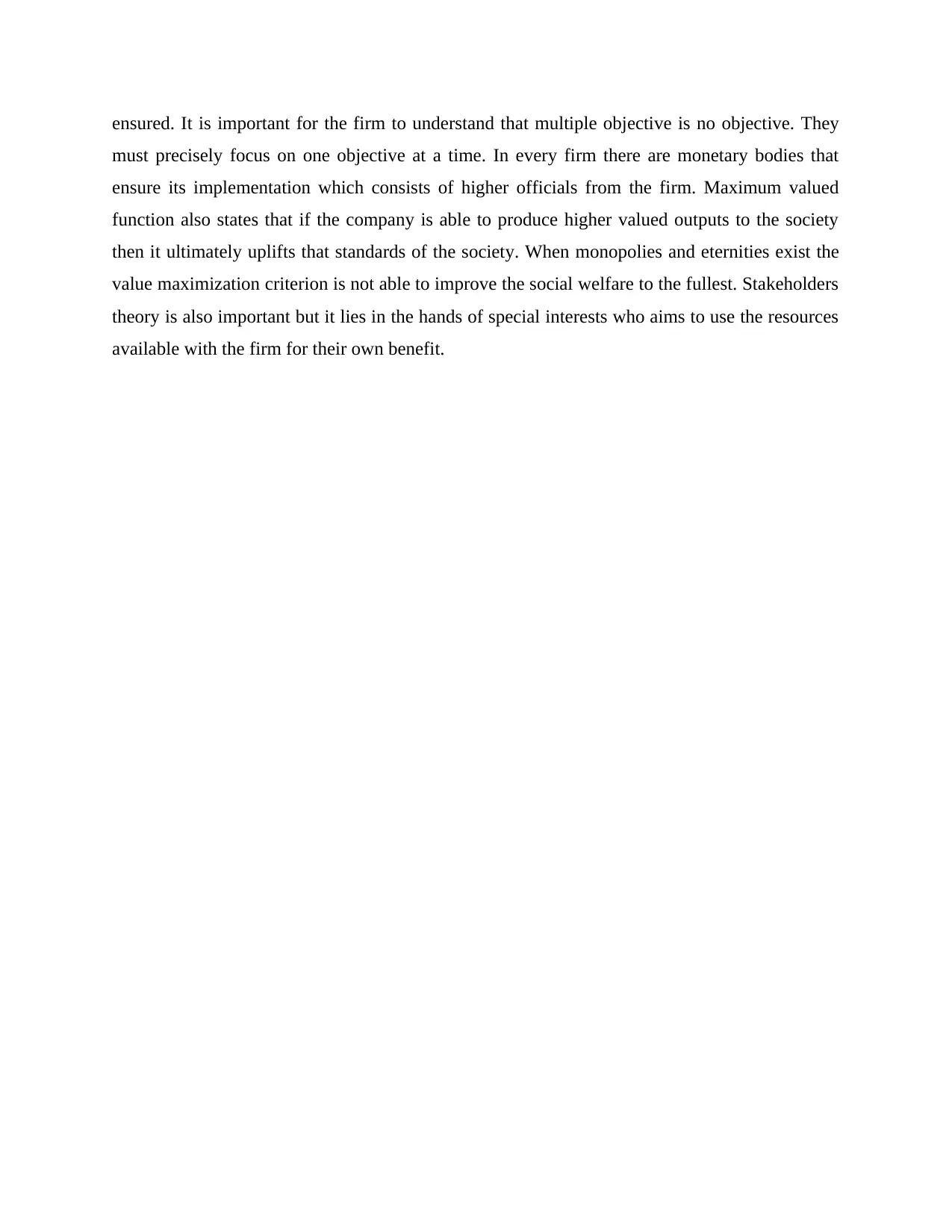
ensured. It is important for the firm to understand that multiple objective is no objective. They
must precisely focus on one objective at a time. In every firm there are monetary bodies that
ensure its implementation which consists of higher officials from the firm. Maximum valued
function also states that if the company is able to produce higher valued outputs to the society
then it ultimately uplifts that standards of the society. When monopolies and eternities exist the
value maximization criterion is not able to improve the social welfare to the fullest. Stakeholders
theory is also important but it lies in the hands of special interests who aims to use the resources
available with the firm for their own benefit.
must precisely focus on one objective at a time. In every firm there are monetary bodies that
ensure its implementation which consists of higher officials from the firm. Maximum valued
function also states that if the company is able to produce higher valued outputs to the society
then it ultimately uplifts that standards of the society. When monopolies and eternities exist the
value maximization criterion is not able to improve the social welfare to the fullest. Stakeholders
theory is also important but it lies in the hands of special interests who aims to use the resources
available with the firm for their own benefit.
Paraphrase This Document
Need a fresh take? Get an instant paraphrase of this document with our AI Paraphraser
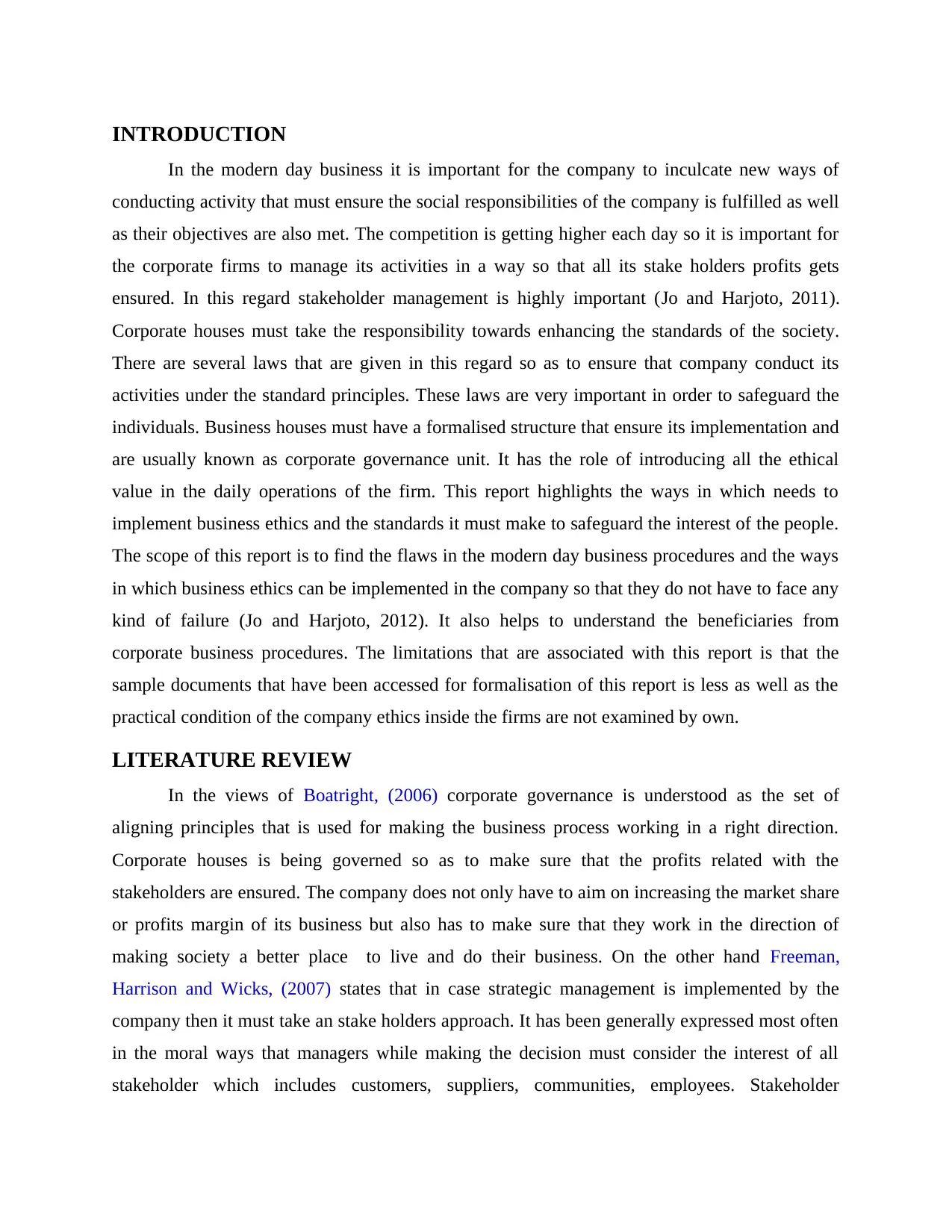
INTRODUCTION
In the modern day business it is important for the company to inculcate new ways of
conducting activity that must ensure the social responsibilities of the company is fulfilled as well
as their objectives are also met. The competition is getting higher each day so it is important for
the corporate firms to manage its activities in a way so that all its stake holders profits gets
ensured. In this regard stakeholder management is highly important (Jo and Harjoto, 2011).
Corporate houses must take the responsibility towards enhancing the standards of the society.
There are several laws that are given in this regard so as to ensure that company conduct its
activities under the standard principles. These laws are very important in order to safeguard the
individuals. Business houses must have a formalised structure that ensure its implementation and
are usually known as corporate governance unit. It has the role of introducing all the ethical
value in the daily operations of the firm. This report highlights the ways in which needs to
implement business ethics and the standards it must make to safeguard the interest of the people.
The scope of this report is to find the flaws in the modern day business procedures and the ways
in which business ethics can be implemented in the company so that they do not have to face any
kind of failure (Jo and Harjoto, 2012). It also helps to understand the beneficiaries from
corporate business procedures. The limitations that are associated with this report is that the
sample documents that have been accessed for formalisation of this report is less as well as the
practical condition of the company ethics inside the firms are not examined by own.
LITERATURE REVIEW
In the views of Boatright, (2006) corporate governance is understood as the set of
aligning principles that is used for making the business process working in a right direction.
Corporate houses is being governed so as to make sure that the profits related with the
stakeholders are ensured. The company does not only have to aim on increasing the market share
or profits margin of its business but also has to make sure that they work in the direction of
making society a better place to live and do their business. On the other hand Freeman,
Harrison and Wicks, (2007) states that in case strategic management is implemented by the
company then it must take an stake holders approach. It has been generally expressed most often
in the moral ways that managers while making the decision must consider the interest of all
stakeholder which includes customers, suppliers, communities, employees. Stakeholder
In the modern day business it is important for the company to inculcate new ways of
conducting activity that must ensure the social responsibilities of the company is fulfilled as well
as their objectives are also met. The competition is getting higher each day so it is important for
the corporate firms to manage its activities in a way so that all its stake holders profits gets
ensured. In this regard stakeholder management is highly important (Jo and Harjoto, 2011).
Corporate houses must take the responsibility towards enhancing the standards of the society.
There are several laws that are given in this regard so as to ensure that company conduct its
activities under the standard principles. These laws are very important in order to safeguard the
individuals. Business houses must have a formalised structure that ensure its implementation and
are usually known as corporate governance unit. It has the role of introducing all the ethical
value in the daily operations of the firm. This report highlights the ways in which needs to
implement business ethics and the standards it must make to safeguard the interest of the people.
The scope of this report is to find the flaws in the modern day business procedures and the ways
in which business ethics can be implemented in the company so that they do not have to face any
kind of failure (Jo and Harjoto, 2012). It also helps to understand the beneficiaries from
corporate business procedures. The limitations that are associated with this report is that the
sample documents that have been accessed for formalisation of this report is less as well as the
practical condition of the company ethics inside the firms are not examined by own.
LITERATURE REVIEW
In the views of Boatright, (2006) corporate governance is understood as the set of
aligning principles that is used for making the business process working in a right direction.
Corporate houses is being governed so as to make sure that the profits related with the
stakeholders are ensured. The company does not only have to aim on increasing the market share
or profits margin of its business but also has to make sure that they work in the direction of
making society a better place to live and do their business. On the other hand Freeman,
Harrison and Wicks, (2007) states that in case strategic management is implemented by the
company then it must take an stake holders approach. It has been generally expressed most often
in the moral ways that managers while making the decision must consider the interest of all
stakeholder which includes customers, suppliers, communities, employees. Stakeholder
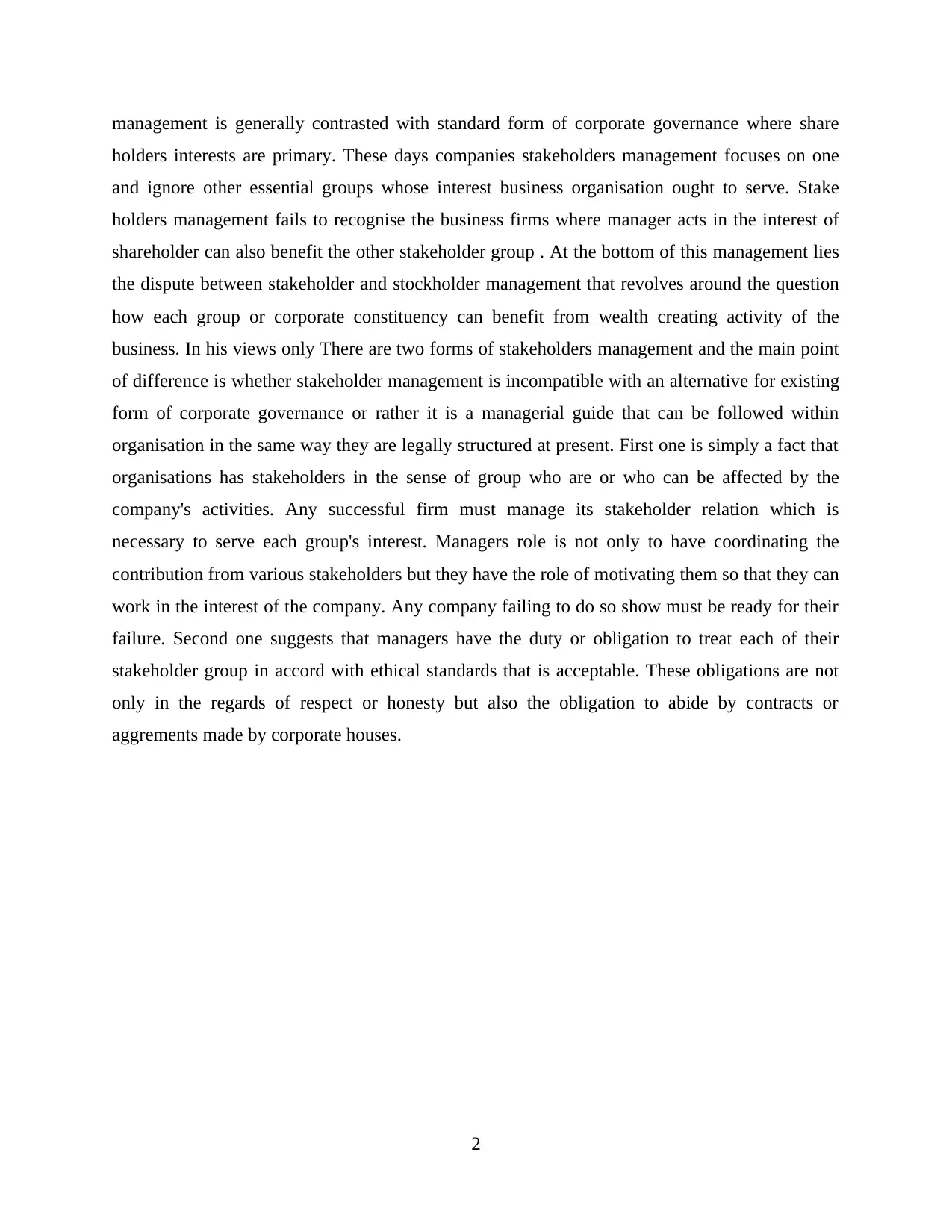
management is generally contrasted with standard form of corporate governance where share
holders interests are primary. These days companies stakeholders management focuses on one
and ignore other essential groups whose interest business organisation ought to serve. Stake
holders management fails to recognise the business firms where manager acts in the interest of
shareholder can also benefit the other stakeholder group . At the bottom of this management lies
the dispute between stakeholder and stockholder management that revolves around the question
how each group or corporate constituency can benefit from wealth creating activity of the
business. In his views only There are two forms of stakeholders management and the main point
of difference is whether stakeholder management is incompatible with an alternative for existing
form of corporate governance or rather it is a managerial guide that can be followed within
organisation in the same way they are legally structured at present. First one is simply a fact that
organisations has stakeholders in the sense of group who are or who can be affected by the
company's activities. Any successful firm must manage its stakeholder relation which is
necessary to serve each group's interest. Managers role is not only to have coordinating the
contribution from various stakeholders but they have the role of motivating them so that they can
work in the interest of the company. Any company failing to do so show must be ready for their
failure. Second one suggests that managers have the duty or obligation to treat each of their
stakeholder group in accord with ethical standards that is acceptable. These obligations are not
only in the regards of respect or honesty but also the obligation to abide by contracts or
aggrements made by corporate houses.
2
holders interests are primary. These days companies stakeholders management focuses on one
and ignore other essential groups whose interest business organisation ought to serve. Stake
holders management fails to recognise the business firms where manager acts in the interest of
shareholder can also benefit the other stakeholder group . At the bottom of this management lies
the dispute between stakeholder and stockholder management that revolves around the question
how each group or corporate constituency can benefit from wealth creating activity of the
business. In his views only There are two forms of stakeholders management and the main point
of difference is whether stakeholder management is incompatible with an alternative for existing
form of corporate governance or rather it is a managerial guide that can be followed within
organisation in the same way they are legally structured at present. First one is simply a fact that
organisations has stakeholders in the sense of group who are or who can be affected by the
company's activities. Any successful firm must manage its stakeholder relation which is
necessary to serve each group's interest. Managers role is not only to have coordinating the
contribution from various stakeholders but they have the role of motivating them so that they can
work in the interest of the company. Any company failing to do so show must be ready for their
failure. Second one suggests that managers have the duty or obligation to treat each of their
stakeholder group in accord with ethical standards that is acceptable. These obligations are not
only in the regards of respect or honesty but also the obligation to abide by contracts or
aggrements made by corporate houses.
2
⊘ This is a preview!⊘
Do you want full access?
Subscribe today to unlock all pages.

Trusted by 1+ million students worldwide
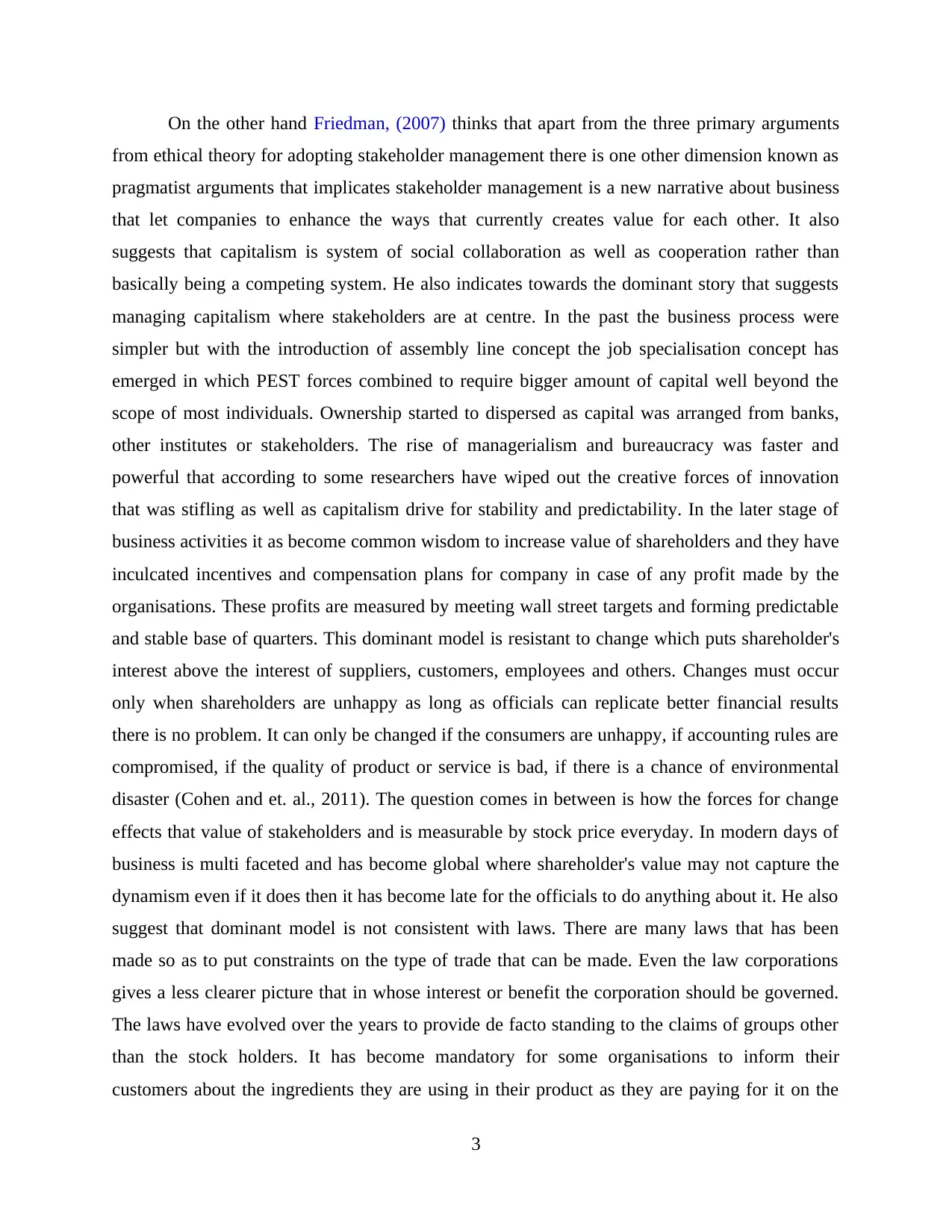
On the other hand Friedman, (2007) thinks that apart from the three primary arguments
from ethical theory for adopting stakeholder management there is one other dimension known as
pragmatist arguments that implicates stakeholder management is a new narrative about business
that let companies to enhance the ways that currently creates value for each other. It also
suggests that capitalism is system of social collaboration as well as cooperation rather than
basically being a competing system. He also indicates towards the dominant story that suggests
managing capitalism where stakeholders are at centre. In the past the business process were
simpler but with the introduction of assembly line concept the job specialisation concept has
emerged in which PEST forces combined to require bigger amount of capital well beyond the
scope of most individuals. Ownership started to dispersed as capital was arranged from banks,
other institutes or stakeholders. The rise of managerialism and bureaucracy was faster and
powerful that according to some researchers have wiped out the creative forces of innovation
that was stifling as well as capitalism drive for stability and predictability. In the later stage of
business activities it as become common wisdom to increase value of shareholders and they have
inculcated incentives and compensation plans for company in case of any profit made by the
organisations. These profits are measured by meeting wall street targets and forming predictable
and stable base of quarters. This dominant model is resistant to change which puts shareholder's
interest above the interest of suppliers, customers, employees and others. Changes must occur
only when shareholders are unhappy as long as officials can replicate better financial results
there is no problem. It can only be changed if the consumers are unhappy, if accounting rules are
compromised, if the quality of product or service is bad, if there is a chance of environmental
disaster (Cohen and et. al., 2011). The question comes in between is how the forces for change
effects that value of stakeholders and is measurable by stock price everyday. In modern days of
business is multi faceted and has become global where shareholder's value may not capture the
dynamism even if it does then it has become late for the officials to do anything about it. He also
suggest that dominant model is not consistent with laws. There are many laws that has been
made so as to put constraints on the type of trade that can be made. Even the law corporations
gives a less clearer picture that in whose interest or benefit the corporation should be governed.
The laws have evolved over the years to provide de facto standing to the claims of groups other
than the stock holders. It has become mandatory for some organisations to inform their
customers about the ingredients they are using in their product as they are paying for it on the
3
from ethical theory for adopting stakeholder management there is one other dimension known as
pragmatist arguments that implicates stakeholder management is a new narrative about business
that let companies to enhance the ways that currently creates value for each other. It also
suggests that capitalism is system of social collaboration as well as cooperation rather than
basically being a competing system. He also indicates towards the dominant story that suggests
managing capitalism where stakeholders are at centre. In the past the business process were
simpler but with the introduction of assembly line concept the job specialisation concept has
emerged in which PEST forces combined to require bigger amount of capital well beyond the
scope of most individuals. Ownership started to dispersed as capital was arranged from banks,
other institutes or stakeholders. The rise of managerialism and bureaucracy was faster and
powerful that according to some researchers have wiped out the creative forces of innovation
that was stifling as well as capitalism drive for stability and predictability. In the later stage of
business activities it as become common wisdom to increase value of shareholders and they have
inculcated incentives and compensation plans for company in case of any profit made by the
organisations. These profits are measured by meeting wall street targets and forming predictable
and stable base of quarters. This dominant model is resistant to change which puts shareholder's
interest above the interest of suppliers, customers, employees and others. Changes must occur
only when shareholders are unhappy as long as officials can replicate better financial results
there is no problem. It can only be changed if the consumers are unhappy, if accounting rules are
compromised, if the quality of product or service is bad, if there is a chance of environmental
disaster (Cohen and et. al., 2011). The question comes in between is how the forces for change
effects that value of stakeholders and is measurable by stock price everyday. In modern days of
business is multi faceted and has become global where shareholder's value may not capture the
dynamism even if it does then it has become late for the officials to do anything about it. He also
suggest that dominant model is not consistent with laws. There are many laws that has been
made so as to put constraints on the type of trade that can be made. Even the law corporations
gives a less clearer picture that in whose interest or benefit the corporation should be governed.
The laws have evolved over the years to provide de facto standing to the claims of groups other
than the stock holders. It has become mandatory for some organisations to inform their
customers about the ingredients they are using in their product as they are paying for it on the
3
Paraphrase This Document
Need a fresh take? Get an instant paraphrase of this document with our AI Paraphraser
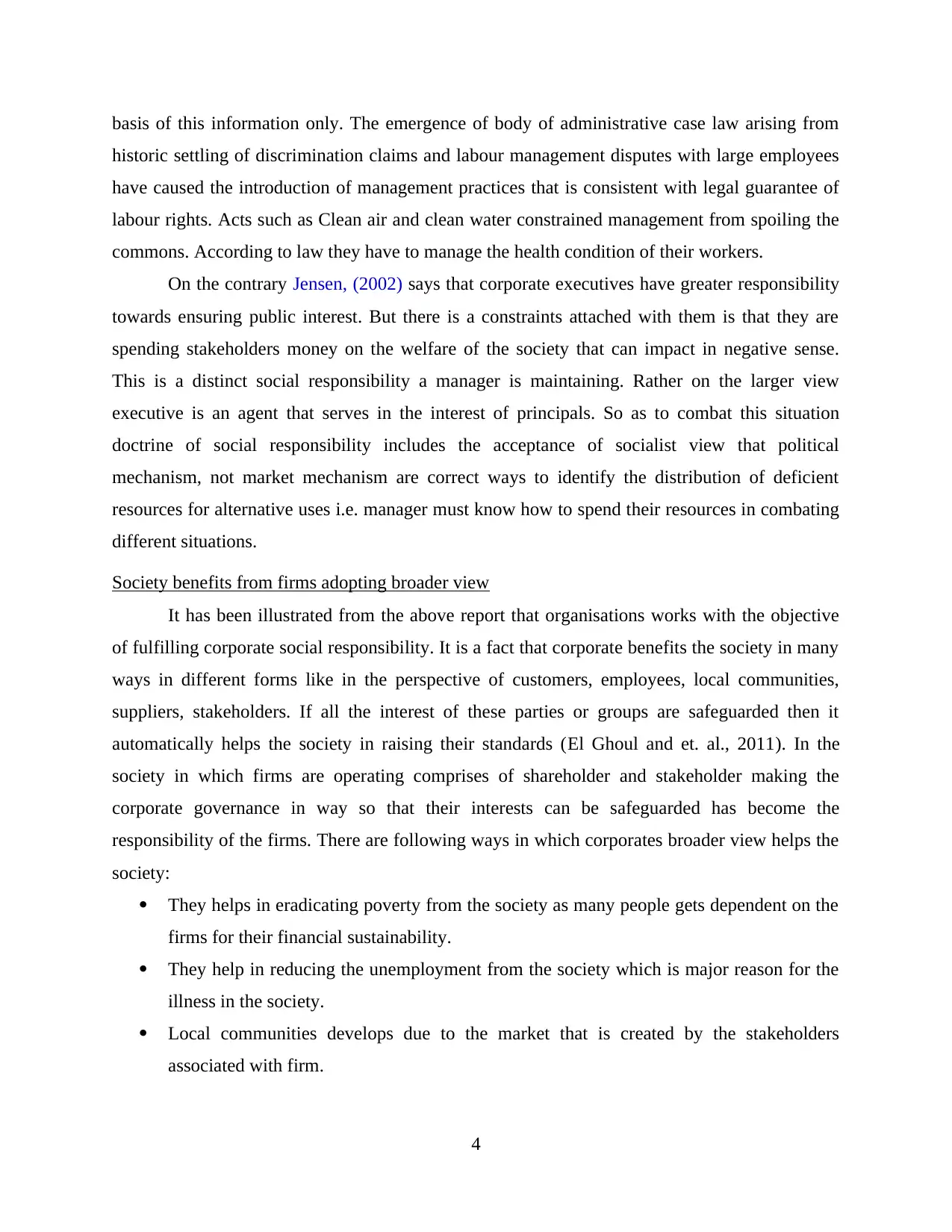
basis of this information only. The emergence of body of administrative case law arising from
historic settling of discrimination claims and labour management disputes with large employees
have caused the introduction of management practices that is consistent with legal guarantee of
labour rights. Acts such as Clean air and clean water constrained management from spoiling the
commons. According to law they have to manage the health condition of their workers.
On the contrary Jensen, (2002) says that corporate executives have greater responsibility
towards ensuring public interest. But there is a constraints attached with them is that they are
spending stakeholders money on the welfare of the society that can impact in negative sense.
This is a distinct social responsibility a manager is maintaining. Rather on the larger view
executive is an agent that serves in the interest of principals. So as to combat this situation
doctrine of social responsibility includes the acceptance of socialist view that political
mechanism, not market mechanism are correct ways to identify the distribution of deficient
resources for alternative uses i.e. manager must know how to spend their resources in combating
different situations.
Society benefits from firms adopting broader view
It has been illustrated from the above report that organisations works with the objective
of fulfilling corporate social responsibility. It is a fact that corporate benefits the society in many
ways in different forms like in the perspective of customers, employees, local communities,
suppliers, stakeholders. If all the interest of these parties or groups are safeguarded then it
automatically helps the society in raising their standards (El Ghoul and et. al., 2011). In the
society in which firms are operating comprises of shareholder and stakeholder making the
corporate governance in way so that their interests can be safeguarded has become the
responsibility of the firms. There are following ways in which corporates broader view helps the
society:
They helps in eradicating poverty from the society as many people gets dependent on the
firms for their financial sustainability.
They help in reducing the unemployment from the society which is major reason for the
illness in the society.
Local communities develops due to the market that is created by the stakeholders
associated with firm.
4
historic settling of discrimination claims and labour management disputes with large employees
have caused the introduction of management practices that is consistent with legal guarantee of
labour rights. Acts such as Clean air and clean water constrained management from spoiling the
commons. According to law they have to manage the health condition of their workers.
On the contrary Jensen, (2002) says that corporate executives have greater responsibility
towards ensuring public interest. But there is a constraints attached with them is that they are
spending stakeholders money on the welfare of the society that can impact in negative sense.
This is a distinct social responsibility a manager is maintaining. Rather on the larger view
executive is an agent that serves in the interest of principals. So as to combat this situation
doctrine of social responsibility includes the acceptance of socialist view that political
mechanism, not market mechanism are correct ways to identify the distribution of deficient
resources for alternative uses i.e. manager must know how to spend their resources in combating
different situations.
Society benefits from firms adopting broader view
It has been illustrated from the above report that organisations works with the objective
of fulfilling corporate social responsibility. It is a fact that corporate benefits the society in many
ways in different forms like in the perspective of customers, employees, local communities,
suppliers, stakeholders. If all the interest of these parties or groups are safeguarded then it
automatically helps the society in raising their standards (El Ghoul and et. al., 2011). In the
society in which firms are operating comprises of shareholder and stakeholder making the
corporate governance in way so that their interests can be safeguarded has become the
responsibility of the firms. There are following ways in which corporates broader view helps the
society:
They helps in eradicating poverty from the society as many people gets dependent on the
firms for their financial sustainability.
They help in reducing the unemployment from the society which is major reason for the
illness in the society.
Local communities develops due to the market that is created by the stakeholders
associated with firm.
4
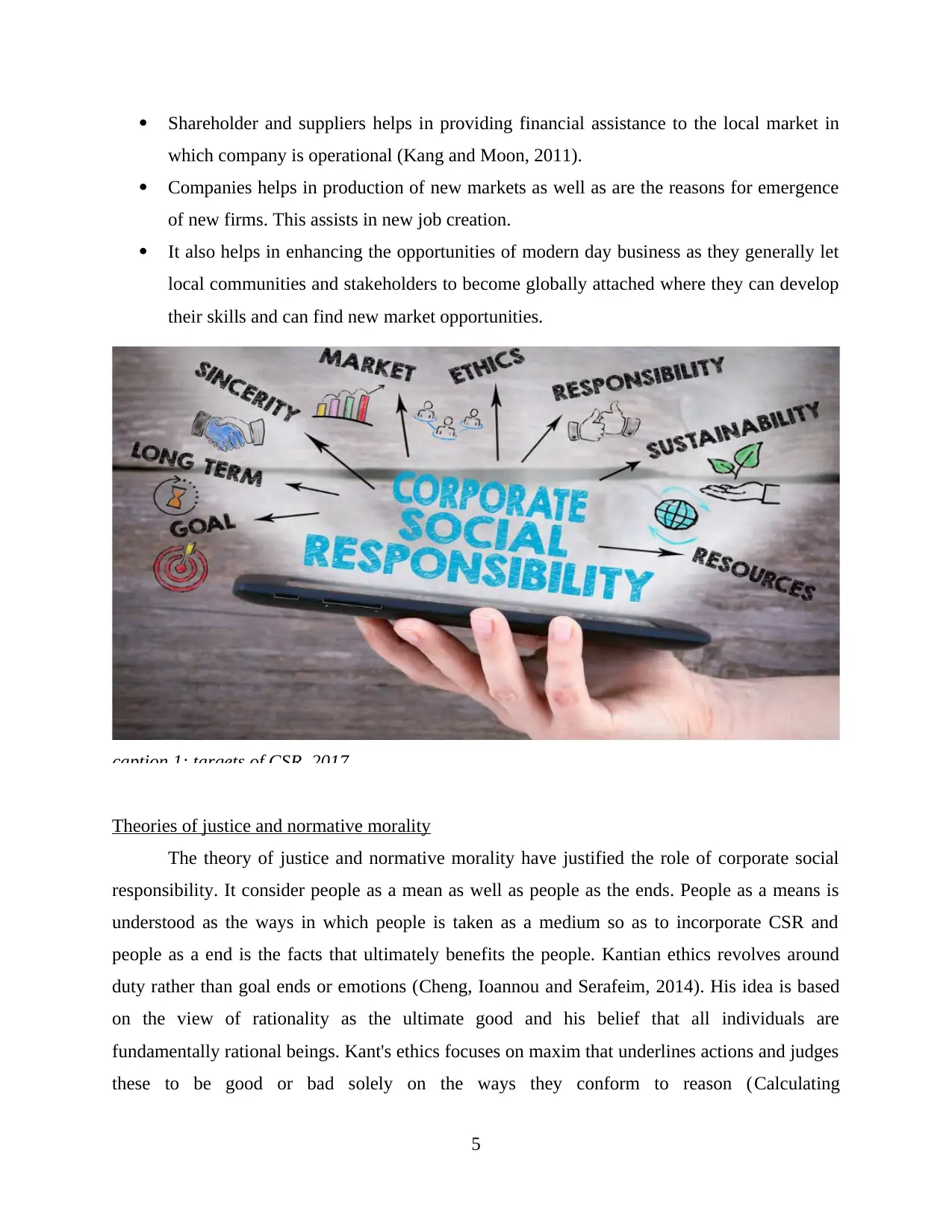
Shareholder and suppliers helps in providing financial assistance to the local market in
which company is operational (Kang and Moon, 2011).
Companies helps in production of new markets as well as are the reasons for emergence
of new firms. This assists in new job creation.
It also helps in enhancing the opportunities of modern day business as they generally let
local communities and stakeholders to become globally attached where they can develop
their skills and can find new market opportunities.
Theories of justice and normative morality
The theory of justice and normative morality have justified the role of corporate social
responsibility. It consider people as a mean as well as people as the ends. People as a means is
understood as the ways in which people is taken as a medium so as to incorporate CSR and
people as a end is the facts that ultimately benefits the people. Kantian ethics revolves around
duty rather than goal ends or emotions (Cheng, Ioannou and Serafeim, 2014). His idea is based
on the view of rationality as the ultimate good and his belief that all individuals are
fundamentally rational beings. Kant's ethics focuses on maxim that underlines actions and judges
these to be good or bad solely on the ways they conform to reason (Calculating
5
caption 1: targets of CSR, 2017
which company is operational (Kang and Moon, 2011).
Companies helps in production of new markets as well as are the reasons for emergence
of new firms. This assists in new job creation.
It also helps in enhancing the opportunities of modern day business as they generally let
local communities and stakeholders to become globally attached where they can develop
their skills and can find new market opportunities.
Theories of justice and normative morality
The theory of justice and normative morality have justified the role of corporate social
responsibility. It consider people as a mean as well as people as the ends. People as a means is
understood as the ways in which people is taken as a medium so as to incorporate CSR and
people as a end is the facts that ultimately benefits the people. Kantian ethics revolves around
duty rather than goal ends or emotions (Cheng, Ioannou and Serafeim, 2014). His idea is based
on the view of rationality as the ultimate good and his belief that all individuals are
fundamentally rational beings. Kant's ethics focuses on maxim that underlines actions and judges
these to be good or bad solely on the ways they conform to reason (Calculating
5
caption 1: targets of CSR, 2017
⊘ This is a preview!⊘
Do you want full access?
Subscribe today to unlock all pages.

Trusted by 1+ million students worldwide
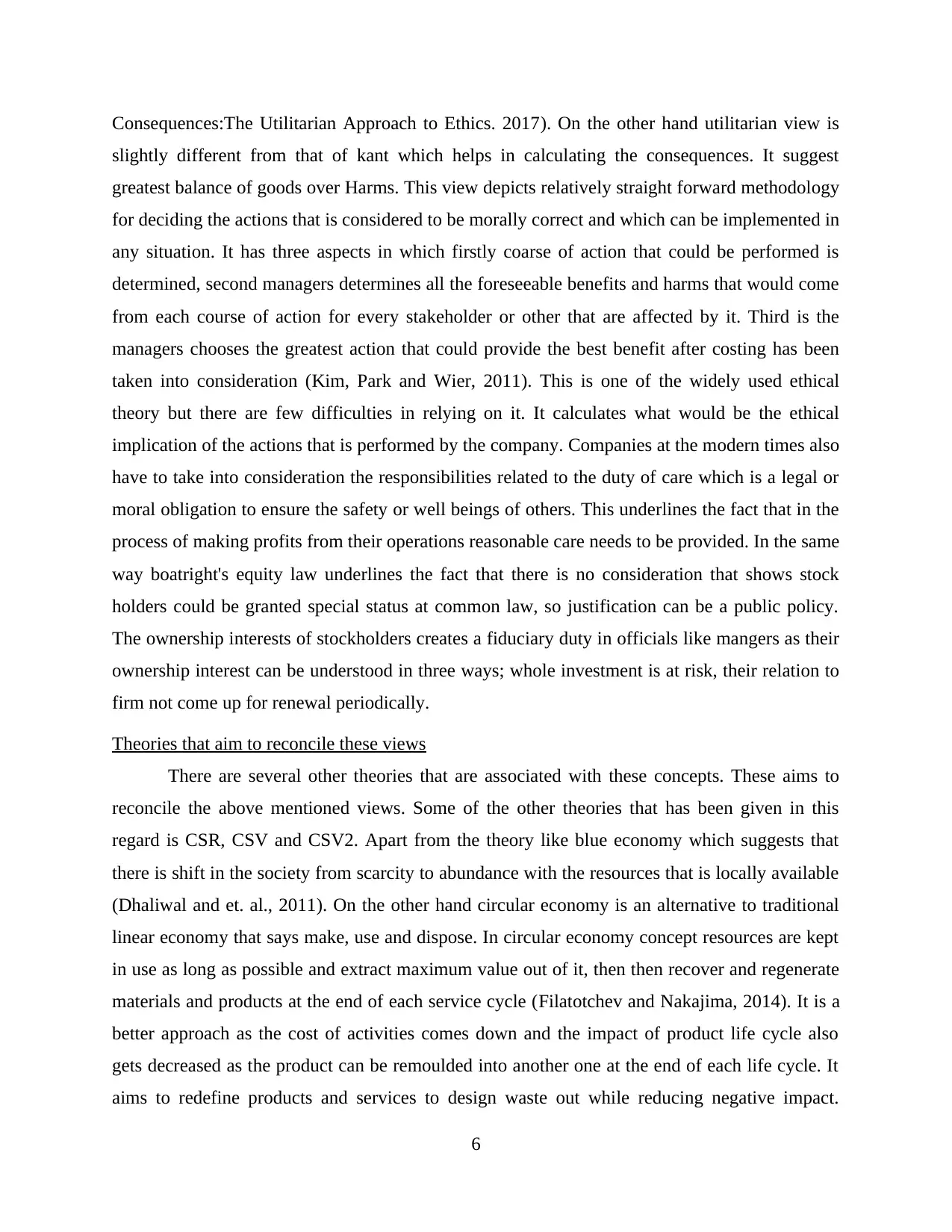
Consequences:The Utilitarian Approach to Ethics. 2017). On the other hand utilitarian view is
slightly different from that of kant which helps in calculating the consequences. It suggest
greatest balance of goods over Harms. This view depicts relatively straight forward methodology
for deciding the actions that is considered to be morally correct and which can be implemented in
any situation. It has three aspects in which firstly coarse of action that could be performed is
determined, second managers determines all the foreseeable benefits and harms that would come
from each course of action for every stakeholder or other that are affected by it. Third is the
managers chooses the greatest action that could provide the best benefit after costing has been
taken into consideration (Kim, Park and Wier, 2011). This is one of the widely used ethical
theory but there are few difficulties in relying on it. It calculates what would be the ethical
implication of the actions that is performed by the company. Companies at the modern times also
have to take into consideration the responsibilities related to the duty of care which is a legal or
moral obligation to ensure the safety or well beings of others. This underlines the fact that in the
process of making profits from their operations reasonable care needs to be provided. In the same
way boatright's equity law underlines the fact that there is no consideration that shows stock
holders could be granted special status at common law, so justification can be a public policy.
The ownership interests of stockholders creates a fiduciary duty in officials like mangers as their
ownership interest can be understood in three ways; whole investment is at risk, their relation to
firm not come up for renewal periodically.
Theories that aim to reconcile these views
There are several other theories that are associated with these concepts. These aims to
reconcile the above mentioned views. Some of the other theories that has been given in this
regard is CSR, CSV and CSV2. Apart from the theory like blue economy which suggests that
there is shift in the society from scarcity to abundance with the resources that is locally available
(Dhaliwal and et. al., 2011). On the other hand circular economy is an alternative to traditional
linear economy that says make, use and dispose. In circular economy concept resources are kept
in use as long as possible and extract maximum value out of it, then then recover and regenerate
materials and products at the end of each service cycle (Filatotchev and Nakajima, 2014). It is a
better approach as the cost of activities comes down and the impact of product life cycle also
gets decreased as the product can be remoulded into another one at the end of each life cycle. It
aims to redefine products and services to design waste out while reducing negative impact.
6
slightly different from that of kant which helps in calculating the consequences. It suggest
greatest balance of goods over Harms. This view depicts relatively straight forward methodology
for deciding the actions that is considered to be morally correct and which can be implemented in
any situation. It has three aspects in which firstly coarse of action that could be performed is
determined, second managers determines all the foreseeable benefits and harms that would come
from each course of action for every stakeholder or other that are affected by it. Third is the
managers chooses the greatest action that could provide the best benefit after costing has been
taken into consideration (Kim, Park and Wier, 2011). This is one of the widely used ethical
theory but there are few difficulties in relying on it. It calculates what would be the ethical
implication of the actions that is performed by the company. Companies at the modern times also
have to take into consideration the responsibilities related to the duty of care which is a legal or
moral obligation to ensure the safety or well beings of others. This underlines the fact that in the
process of making profits from their operations reasonable care needs to be provided. In the same
way boatright's equity law underlines the fact that there is no consideration that shows stock
holders could be granted special status at common law, so justification can be a public policy.
The ownership interests of stockholders creates a fiduciary duty in officials like mangers as their
ownership interest can be understood in three ways; whole investment is at risk, their relation to
firm not come up for renewal periodically.
Theories that aim to reconcile these views
There are several other theories that are associated with these concepts. These aims to
reconcile the above mentioned views. Some of the other theories that has been given in this
regard is CSR, CSV and CSV2. Apart from the theory like blue economy which suggests that
there is shift in the society from scarcity to abundance with the resources that is locally available
(Dhaliwal and et. al., 2011). On the other hand circular economy is an alternative to traditional
linear economy that says make, use and dispose. In circular economy concept resources are kept
in use as long as possible and extract maximum value out of it, then then recover and regenerate
materials and products at the end of each service cycle (Filatotchev and Nakajima, 2014). It is a
better approach as the cost of activities comes down and the impact of product life cycle also
gets decreased as the product can be remoulded into another one at the end of each life cycle. It
aims to redefine products and services to design waste out while reducing negative impact.
6
Paraphrase This Document
Need a fresh take? Get an instant paraphrase of this document with our AI Paraphraser
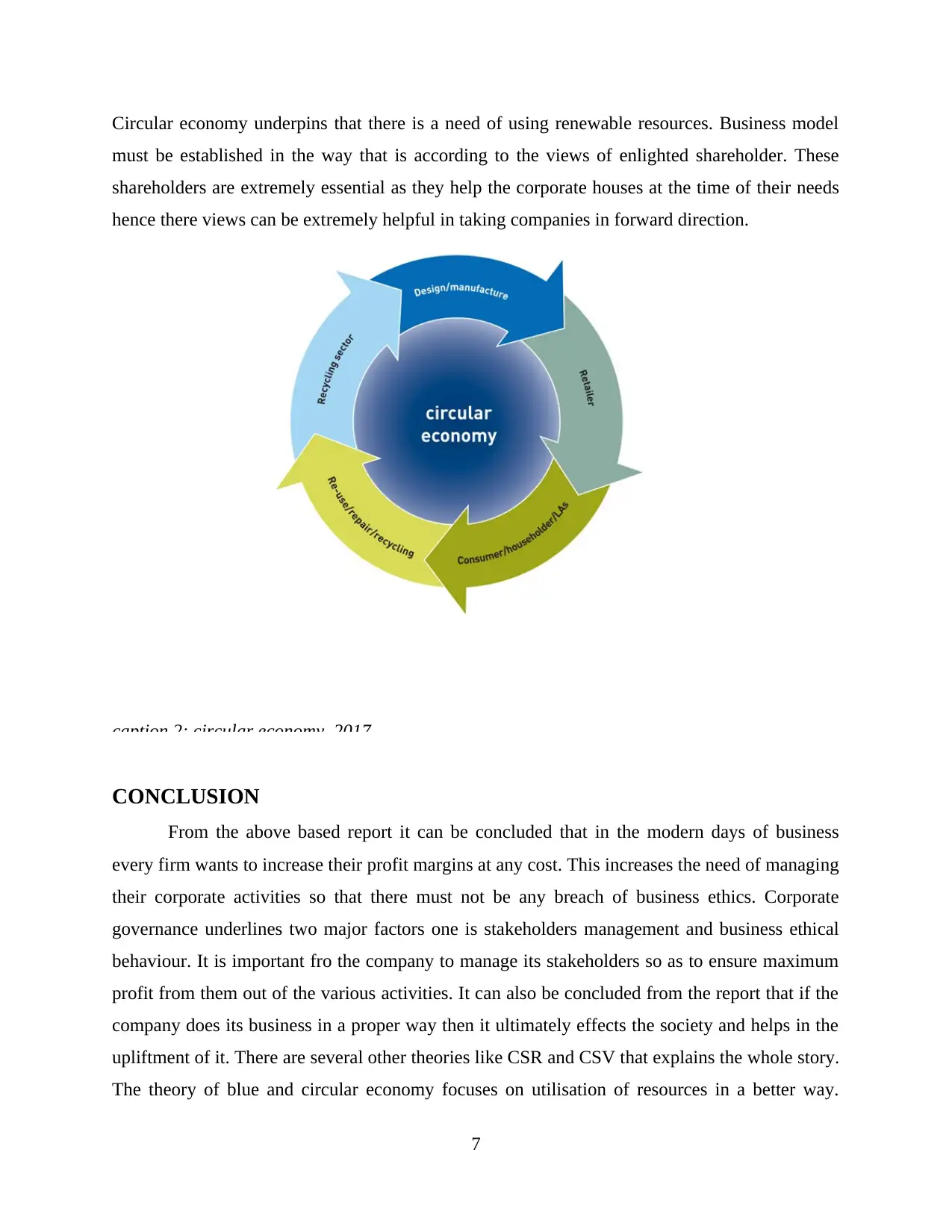
Circular economy underpins that there is a need of using renewable resources. Business model
must be established in the way that is according to the views of enlighted shareholder. These
shareholders are extremely essential as they help the corporate houses at the time of their needs
hence there views can be extremely helpful in taking companies in forward direction.
CONCLUSION
From the above based report it can be concluded that in the modern days of business
every firm wants to increase their profit margins at any cost. This increases the need of managing
their corporate activities so that there must not be any breach of business ethics. Corporate
governance underlines two major factors one is stakeholders management and business ethical
behaviour. It is important fro the company to manage its stakeholders so as to ensure maximum
profit from them out of the various activities. It can also be concluded from the report that if the
company does its business in a proper way then it ultimately effects the society and helps in the
upliftment of it. There are several other theories like CSR and CSV that explains the whole story.
The theory of blue and circular economy focuses on utilisation of resources in a better way.
7
caption 2: circular economy, 2017
must be established in the way that is according to the views of enlighted shareholder. These
shareholders are extremely essential as they help the corporate houses at the time of their needs
hence there views can be extremely helpful in taking companies in forward direction.
CONCLUSION
From the above based report it can be concluded that in the modern days of business
every firm wants to increase their profit margins at any cost. This increases the need of managing
their corporate activities so that there must not be any breach of business ethics. Corporate
governance underlines two major factors one is stakeholders management and business ethical
behaviour. It is important fro the company to manage its stakeholders so as to ensure maximum
profit from them out of the various activities. It can also be concluded from the report that if the
company does its business in a proper way then it ultimately effects the society and helps in the
upliftment of it. There are several other theories like CSR and CSV that explains the whole story.
The theory of blue and circular economy focuses on utilisation of resources in a better way.
7
caption 2: circular economy, 2017
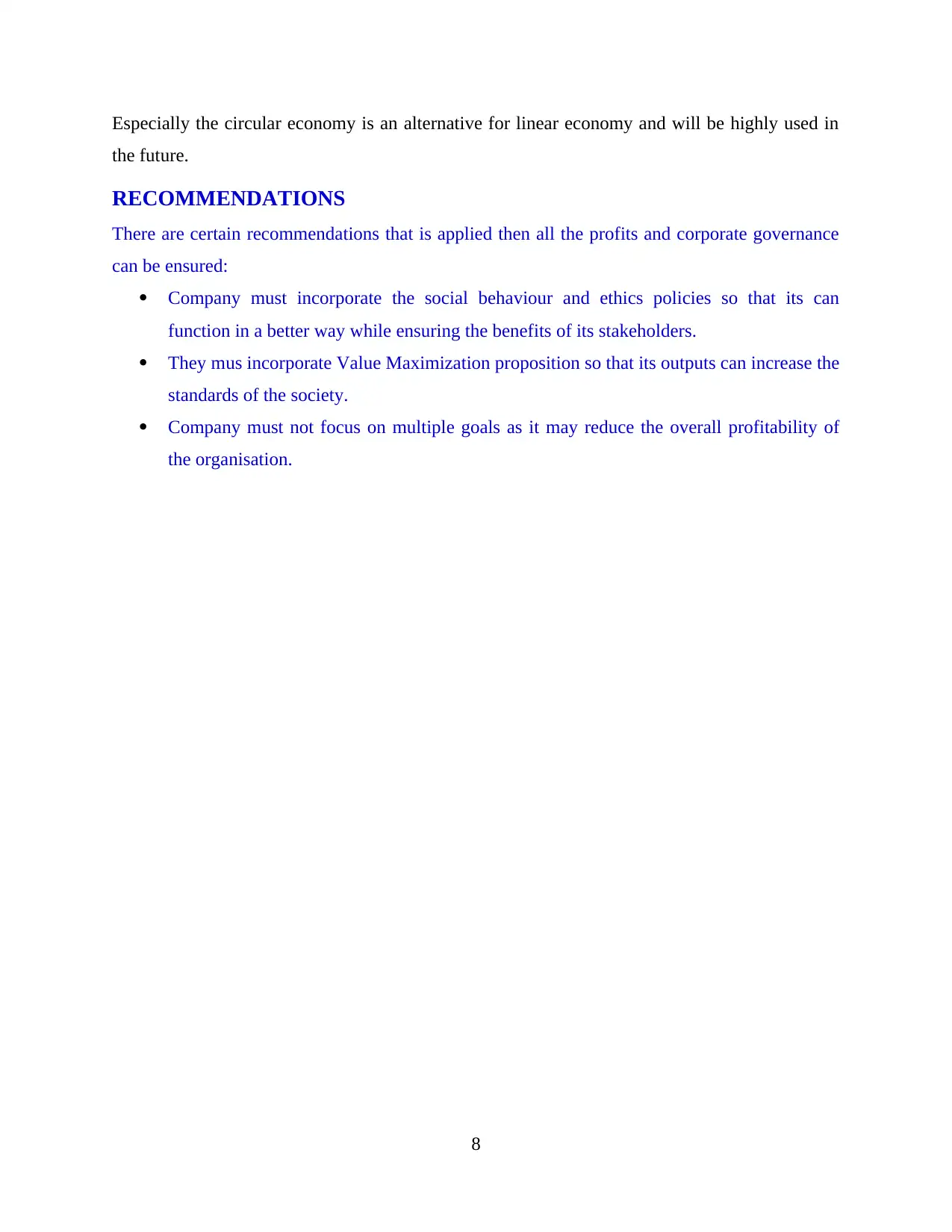
Especially the circular economy is an alternative for linear economy and will be highly used in
the future.
RECOMMENDATIONS
There are certain recommendations that is applied then all the profits and corporate governance
can be ensured:
Company must incorporate the social behaviour and ethics policies so that its can
function in a better way while ensuring the benefits of its stakeholders.
They mus incorporate Value Maximization proposition so that its outputs can increase the
standards of the society.
Company must not focus on multiple goals as it may reduce the overall profitability of
the organisation.
8
the future.
RECOMMENDATIONS
There are certain recommendations that is applied then all the profits and corporate governance
can be ensured:
Company must incorporate the social behaviour and ethics policies so that its can
function in a better way while ensuring the benefits of its stakeholders.
They mus incorporate Value Maximization proposition so that its outputs can increase the
standards of the society.
Company must not focus on multiple goals as it may reduce the overall profitability of
the organisation.
8
⊘ This is a preview!⊘
Do you want full access?
Subscribe today to unlock all pages.

Trusted by 1+ million students worldwide
1 out of 14
Related Documents
Your All-in-One AI-Powered Toolkit for Academic Success.
+13062052269
info@desklib.com
Available 24*7 on WhatsApp / Email
![[object Object]](/_next/static/media/star-bottom.7253800d.svg)
Unlock your academic potential
Copyright © 2020–2026 A2Z Services. All Rights Reserved. Developed and managed by ZUCOL.




